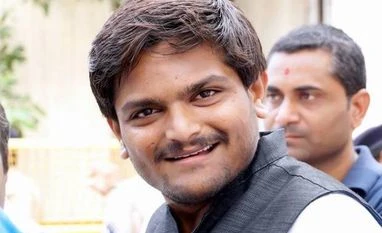Unknown till a month-and-a-half ago, he has emerged as the tallest leader of the Patidar community in Gujarat. Youths have started calling him Patidar Hriday Samrat.
If his rally in Ahmedabad on Tuesday is anything to go by, there could be serious trouble for the Bharatiya Janata Party when elections, to the Lok Sabha as well as the Gujarat Assembly, are held in 2019. The Patidars, after all, make up 10 per cent of the state's population. By 2019, Patel will be 25, eligible to contest the elections.
More From This Section
It is noteworthy that at the Ahmedabad rally, Patel chose to address the crowds in Hindi, which led many to believe that he harbours national ambitions. This may not be off the mark because Patel has talked of the Patidar community of 270 million across India which includes such worthies as Nitish Kumar, the chief minister of Bihar, and Chandrababu Naidu, the chief minister of Andhra Pradesh.
Is he the saviour Opposition parties have been praying for? Nitish Kumar has already endorsed Patel's demand for including Patidars in the "other backward castes" category which would entitle them for reservations in government-run institutes and government jobs. Patel is said to have been inspired by Delhi Chief Minister Arvind Kejriwal. Also doing the rounds is the talk of a Congress heavyweight encouraging him to go ballistic against Modi.
So far, Patel has maintained that he is totally apolitical. At various times, he has invoked Mahatma Gandhi, Sardar Patel, Bhagat Singh and Chandra Shekhar Azad. He also admires Balasaheb Thackeray for his decisiveness and strength.
Born to Usha and Bharatbhai Patel, a small-time businessman and a BJP activist, in Viramgam on July 20, 1993, Patel did BCom from Sahajanand College in Ahmedabad in 2013. After passing out with 50 per cent marks, he helped his father for a short while in business.
Those who have known him for a while call him adventurous - a risk taker of sorts. "He never liked to do the mundane things that other youths usually do. Even during his college days, he would often look to reach out to community and political leaders and try to gain proximity with them," a BJP worker who doesn't want to be named reminisces. "Patel would be everywhere."
Patel's public engagement began in 2011 when the Sardar Patel Group was started by community leaders like Lalji Patel for the protection of Patidars. Soon, youths began approaching it for issues like admissions to government colleges despite good scores. That may have made Patel think of reservation for his community. The tipping point came when his sister, Monika, missed out on a government scholarship even though she had scored 84 per cent in the exams, while her OBC friend, who had got lesser, managed to get it.
According to some Patidar leaders, Patel loves to wield power and that led him to split from the Sardar Patel Group and start Patidar Anamat Andolan Samiti in July. Efforts to unite the two in recent rallies, especially in Ahmedabad, failed due to ideological differences between Patel and Lalji. "We do not agree over the means by which our demand has to be met. They intend to go to any extent which we do not agree upon," Lalji had said earlier.
Reservation is an emotive issue, and many communities have agitated for it over the decades. Though Patidars are considered prosperous, not just in India but also abroad, Patel says that's a myth and the community is in dire need of reservations. He has asserted in interviews that only 5 to 10 per cent Patidars are rich. "If you visit a village home in the Saurashtra region, you'll see people don't have enough to eat," he recently told BBC. "And if you look at the farmers that have killed themselves in the past 10 years, the largest numbers are from the Patidars."
While the matter is open to debate, one thing is for sure: Patel has succeeded in whipping up the passions in the community. His first rally on July 6 was attended by 12,000 - the latest at Ahmedabad saw almost 500,000 congregate! So far, Patel has held 100-odd rallies at various places in Gujarat.
The all-important question is, how long will Patel be able to keep the momentum going? For one, he has already got rivals in the Patidar community. These detractors insist that Patel would go to any extent to gain popularity and wield power. Some political pundits have found his speeches immature, though full of vigour. His demand that Anandiben Patel, the chief minister of Gujarat, should come to the rally to take his charter of demands drew flak from several quarters.
Patel has let the genie out of the bottle. Much will now depend on how Modi can find a solution to this complex political issue. But there are no easy solutions. And Modi cannot let the issue fester: local body elections in Gujarat are due in two months' time. Not for nothing have some in Gujarat started to say that Patel is lambi race no ghodo.
)